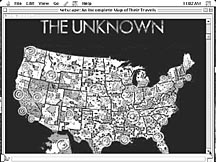
| Exploring the story world of hypertext by Joe Miller  The human mind isn't organized like a book. Rather than following a straight narrative path, with ideas aligning themselves according to beginning, middle and end, our thoughts fly all over the place. Computers can approximate this phenomenon because they offer the possibility of linking different ideas together through unconventional means. The Internet is an excellent example of this, with its dense matrix of interconnected hypertext links. But even before the Internet came into existence, writers and artists seized the computer as a means to express the complexity of human thought. As far back as the early '80s, these creative pioneers began authoring hypertext novels where readers could read a short portion of a story and choose from several linking options leading them to still other parts of the story. Rather than reading the story from cover to cover, readers could explore the story as though it were a verbal landscape offering multiple routes and narrative possibilities. The human mind isn't organized like a book. Rather than following a straight narrative path, with ideas aligning themselves according to beginning, middle and end, our thoughts fly all over the place. Computers can approximate this phenomenon because they offer the possibility of linking different ideas together through unconventional means. The Internet is an excellent example of this, with its dense matrix of interconnected hypertext links. But even before the Internet came into existence, writers and artists seized the computer as a means to express the complexity of human thought. As far back as the early '80s, these creative pioneers began authoring hypertext novels where readers could read a short portion of a story and choose from several linking options leading them to still other parts of the story. Rather than reading the story from cover to cover, readers could explore the story as though it were a verbal landscape offering multiple routes and narrative possibilities. This past weekend, several of these cyberspace authors, artists and programmers gathered at a mansion in Douglas County to discuss one another's work and the future of their craft. Dubbed CyberMountain Colloquium, the gathering marked the first time top hypertext writers and programmers met and shared ideas. Network wires snaked throughout the house to connect the dozen or so computers colloquium attendees used to demonstrate their latest work and brainstorm ways to make it better. In each room was a different session. In one, Deena Larsen, who has written three hypertext novels and has five more coming out in the next three months, was showing others a prototype of her new book, Disappearing Rain. As Larsen read through the text, others leaned forward and tried to keep up with the story on the changing screens. Some got a few of the characters confused and raised constructive criticism to Larsen. "This is the first time anybody's done a hypertext mystery," Larsen told them, grateful for their input. "So I need to know what clues come in where." Larsen says that one of the best things about writing with new media is that "every single hypertext writer is creating a new genre. Nobody does it the same way." A tour around the various rooms of the mansion, where workshops were taking place, reinforced this observation. In one an author described his work in progress as being more like a geometric form than a story because its various chapters and elements were arranged in a cube-like structure. In another, a woman showed off an epic poem where readers could use hypertext links to jump intuitively between stanzas. Others talked about utilizing graphics, moving images and sound in their work. "I'm also a musician," said Lawrence J. Clark, who wrote the hypertext novel SinCity. "Now I can write a book with a soundtrack." Besides building on their craft, attendees focused on how to attract a larger audience. At present, the audience for these works is relatively small. A Waterton, Mass. firm that's the leading publisher of the genre carries 37 titles. The most popular of these rack up sales in the low four figures, according to Eastgate chief scientist Mark Bernstein, who attended the colloquium. Shoppers can browse their titles at www.eastgate.com and then purchase them with a credit card. The hypertext books are then shipped to the customer on disk. Scott Rettberg, the Chicago-based co-author of The Unknown (www.soa.uc.edu/user/unknown/trip.htm), says that in order to net a larger audience, budding hypertext authors will need to concentrate less on complex high-tech structures for their books and more on accessible content. "We can get together a group of people like those at this conference who appreciate complex structure," he said, "but take that to a mass audience: two clicks and they're gone. It's going to be important for people to start thinking about how readers respond to this work. Because without the reader, it's not literature." "Do you mean something like a Tom Clancy novel?" Clark asked him. "I don't think anyone will want to read one of his long novels on the Web." "I don't want to read Tom Clancy anywhere," Rettberg replied. |
(Send a Letter to the Editor at bweditor@tesser.com)